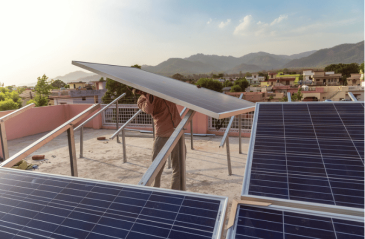
The power of storytelling in climate leadership

Bill Morneau: We are facing an infrastructure deficit of about half trillion Canadian dollars
Share articleBill Morneau: Better infrastructure helps grow the economy and create a more productive society
Share articleBill Morneau: We aim to work with the private sector to amplify our investments
Share articleWe put our vision for government into practice through learning partner projects that align with our values and help reimagine government so that it works for everyone.
What image comes to mind when you think of Canada? Its prime minister, perhaps? The magnificence of its natural scenery? The sheer size of its territory? World-class cities like Vancouver or Toronto? What probably doesn't come to mind, unless you're Canadian yourself, is the state of the country's infrastructure which is - somewhat surprisingly - far from best in class.
Unfortunately, decades of under-investment have left the country with shortfalls aplenty. Based on 2009-10 data, the Federation of Canadian Municipalities has assessed the condition of drinking water, waste water, storm water and road infrastructure across municipalities and estimated the cost of bringing these systems up to a “good” standard at C$172 billion - a number that excludes public transport investment and other priorities such as ports and power distribution. Bill Morneau, however, is planning to change that.
Appointed the country's finance minister when the Trudeau government came to power in October 2015, Morneau is spearheading proposals to double spending on infrastructure over the next decade. "For us it is about growing the economy and creating a more productive society through improved transit systems, better affordable housing and dealing with the impacts of climate change," he explains. "Given that we had a good balance sheet, these investments for us in Canada made eminent sense."
Of course, the challenges facing Canada differ markedly from those in developing countries, where deep-rooted issues such as inadequate access to water and sanitation facilities - to name but two - remain rife. Nonetheless, in Canada it is of particular importance. Its sheer size, not to mention its harsh winters, mean that Canadian citizens and businesses alike are massively reliant on a well-functioning network of transport, communications and power systems to support their day-to-day activities.
"We are facing an infrastructure deficit that is estimated to be a half trillion Canadian dollars," admits Morneau. "This is based on a lot of infrastructure that was developed a couple of generations ago and which now needs to be renewed, as well as the need for new infrastructure."
Adding greater urgency to this issue have been signs of an unwelcome slowdown in the Canadian economy. The province of Alberta, for example, is in the midst of a "severe recession", and there are other indicators that the fragile global economy is starting to take its toll - all the more reason, then, to increase spending on infrastructure. In the short term it helps by supporting jobs and businesses, leading to lower unemployment and higher economic growth; in the long term it boosts productivity and the competitiveness of private businesses, leading to higher living standards.
Morneau is in no doubt about its potential to get the economy moving, or of the ability of the private sector to take on these investments and magnify their effect. "We looked at not only those investments which would have the biggest multiplier effect and would create the biggest impact economically, but also how we deal with what we are now calling globally 'inclusive growth'," he explains.
"So now we are looking at how we can amplify those investments and create an approach to working with institutional investors and pension funds - of which we have some very sophisticated examples in Canada - to take the government funds and amplify them multiple times by creating projects that can have a big impact but also make sense for the investors. This is what we aspire to do, and if we can take our federal dollars and magnify them five times it will have a significantly positive impact on our country in both the short and the long term."
The pursuit of private sector investment for infrastructure is not a new phenomenon. Countries around the world have long sought to use the power of the private sector to bridge gaps in their infrastructure. Morneau - himself a businessman of national renown - believes that a good starting point is to listen to what investors want.
"We set about looking at ways we can best attract private investment," he says. "From institutional and pension fund investors we heard about the need for a real pipeline of bankable projects so they can see the investment horizon. We also heard - particularly from the largest institutional investors - about the need for large projects. And so for us that means we need to look for transformational projects."
Interestingly, the investors have also been explicit about the need for the government to push its experts front and centre in any negotiation. "The investors also want to have counterparties on our side that really understand the transactions," he points out. "It is about the balance of power. It is an awful lot better for a sophisticated investor if the people who are actually putting out the projects really understand how they can contract together. These projects will hopefully have long-term revenue streams, and so you have to think about how you contract between the parties and mitigate the political risk."
Building up the talent on both sides creates a powerful ripple effect, Morneau continues. "This is because our people will see that we have done a good job negotiating the projects," he points out. "And we will also probably need to coinvest. This is important for us but it is also important for the investors, who will see that we have skin in the game and will share some of the risk. So we need to look at all the aspects that an institutional long-term investor wants, because that is the way we are going to attract the kind of investment that we want and amplify our public investment."
Infrastructure is an essential component of life in any country. From roads to ports, utilities to housing, it underpins and affects the fabric of society in ways large and small. But while Canada is clearly (and rightly) his priority, Morneau is also keen to stress that the government's hopes and ambitions possess some global resonance.
"Thinking more broadly, we also care enormously about global growth; the idea that we can either be an example or help to encourage this to happen around the world is for us very important and we are actively engaged in it," he concludes. "We see it as part of our interest in global growth, and we hope that we can be helpful as an example."
While only time will tell if their approach succeeds, in the years to come "infrastructure" may well be added to the long list of images conjured up by the word "Canada". Watch this space.











